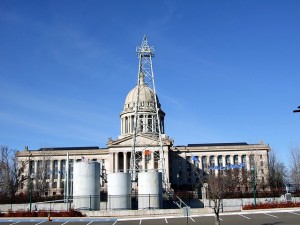Oklahoma Legislature Passes Controversial Tax Incentive for New Oil and Gas Wells
-
Joe Wertz

josephleenovak / flickr
The Oklahoma Legislature on Thursday approved a bill that makes permanent a generous tax incentive for oil and gas production.
The votes followed a heated debate at the Capitol, and months of disagreement between lawmakers, industry lobbyists and energy executives, which are divided on the measure.
The bill’s approval was decried by opponents, like the left-leaning Oklahoma Policy Institute, which described the measure as a “subsidy” for the “well-connected” oil and gas industry. And one Oklahoma City attorney is already considering a constitutional challenge to the bill. House Bill 2562 replaces a tax incentive for horizontal drilling with one for both horizontal and traditional, vertical drilling.
The old incentive was installed in the mid-’90s to spur new horizontally drilled wells, which, at the time, were a novel and experimental way to produce oil and natural gas. The incentive reduced state taxes on oil and gas production, set at 7 percent, to 1 percent for the first four years of production. Horizontal drilling is now common practice and employed in most new wells drilled in Oklahoma.
The incentive expires in 2015, and many lawmakers, executives at several Oklahoma energy giants, and industry groups like the Oklahoma Independent Producers Association and the Oil and Gas Association of Oklahoma pushed hard to keep the tax rate from returning to 7 percent.
HB 2562 sets the tax rate at 2 percent for new oil and gas wells — horizontal and vertical — drilled in Oklahoma for the first three years. The bill passed the House 61-34 and the Senate 30-14, and now heads to Gov. Mary Fallin for consideration. Fallin expressed support for an early version of the bill.
‘Not every well hits a jackpot’
In August 2013, Mike McDonald of Triad Energy told StateImpact drilling incentives are key to offsetting the high cost of horizontally drilled wells. Wells in other big-energy states, like North Dakota and Texas, produce more oil and gas, which is why, McDonald argued, the incentive helps Oklahoma compete with other states for new drilling activity, and works to stabilize the risky business of oil and gas drilling.
Other oil and gas companies made similar arguments, as did House Speaker Jeff Hickman, R-Fairview, who authored the new legislation. Hickman says the bill makes an especially big difference for “marginal” wells
“Not every well hits a jackpot,” the speaker said, arguing for the bill on the floor of the House. “These companies need to recoup their costs as quickly as they can so they can drill more wells.”
In May 2014, executives from three of the state’s biggest oil and gas companies — Chesapeake Energy, Continental Resources and Devon Energy — proposed an incentive that that was twice as high as the current incentivized rate, but well below the 7 percent rate that’s on the books. The Oklahoman‘s Adam Wilmoth reports:
A good oil well in Oklahoma produces up to 400 barrels a day. In east Texas, wells are producing up to 1,500 barrels a day, and North Dakota wells can produce up to 4,000 barrels a day.
“The rates of return on a whole lot of wells being drilled in Oklahoma are 10 to 15 percent compared to 20, 30, 45 percent returns elsewhere,” [Devon Energy’s Larry] Nichols said.
But as Oklahoma Watch’s Warren Vieth reports, those three companies sang a “different tune” in reports and presentations to Wall Street investors.
In documents filed with the Securities and Exchange Commission and in discussions with security analysts as recently as last week, the firms describe their Oklahoma drilling programs in enthusiastic terms, touting “world-class” plays and “premier” geological formations.
Drilling Dissent
But some other prominent oil and gas executives disagree. Billionaire oilman George Kaiser and his company’s chief financial officer, Don Millican, say tax rates have no effect on where, geographically, companies decide to drill.
“People are drilling where the hydrocarbons are,” Millican told StateImpact in March.
Kaiser told the Wall Street Journal he thinks letting the state oil and gas tax return to 7 percent would help Oklahoma’s state budget, which he says is in “desperate financial circumstances.”
A higher tax on oil-and-gas production could help the state pay for education and much needed infrastructure improvements, he says in a prepared statement. Raising the production tax “doesn’t move the needle in the decision to drill.”
Constitutional Challenge
Oklahoma City attorney Jerry Fent, an anti-tax crusader who has successfully challenged legislation in the past, says the bill likely violates the Oklahoma Constitution, which was amended in 1992 after voters approved State Question 640, requiring any tax increase to go before a vote of the people if it doesn’t win a three-fourths vote in both houses of the legislature.
SQ 640 also prevents any revenue bill from being passed during the last five days of the legislative session. HB 2562 didn’t meet the three-fourths vote requirement, and if the 2014 legislative session ends on May 23, as planned, the measure would break the last-week rule, too.
But it’s unclear if HB 2562 is considered a “tax bill” or measure about “economic incentives.” During the floor debate, Speaker Hickman repeatedly reiterated to House members that they were voting to change an incentive, not tinkering with the state’s gross production tax rate.
Fent doesn’t buy it. He’s writing a letter to Gov. Fallin to urge her not to sign the bill. If she does, Fent says’s he’ll consider filing a lawsuit.
“The bottom line is the bill is a revenue increase,” he says. “It’s raising it from 1 to 2 [percent]. Then, later on, it goes to 7. I guess the courts will just have to go through that and exercise some kind of logic to it.”
